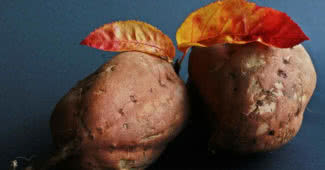Protein is an essential part of a healthy diet. Along with maintaining muscle mass, protein ensures every cell in the body operates properly and provides a feeling of fullness between meals. Although we often rely on protein-rich foods like meat and dairy, incorporating certain plant-based protein sources in your diet plan will also help you provide enough protein needed for the body’s functioning.
Check out the top ten plant-based protein sources as per USDA that help you meet your protein needs along with vitamins, minerals, fiber, and beneficial plant compounds to stay healthy.
10Pinto Beans, 1.9 g
Besides being high in carbs, fiber, and protein, they contain various minerals, including iron, magnesium, small amounts of vitamin B, zinc, and calcium. The moderate levels of antioxidant isoflavones found in pinto beans can help reduce the risk of post-menopausal cancers and osteoporosis. Their high protein and iron content make them a great choice for those looking to boost their protein intake.
9Spinach, 3 g
It is also high in nitrates, which can help lower blood pressure and reduce the risk of heart disease. Along with a trusted source of vitamin K, one cup of spinach can satisfy over 100% of a person’s daily needs. Lastly, spinach can promote eye health and fight against cancer.
Top 10 Healthiest Foods In The World
8Alfalfa Sprouts, 3.9 g
Alfalfa is a legume from South, and Central Asia used worldwide as a protein supplement and herb for its medicinal properties. One cup of raw alfalfa sprouts contains 3.9g of protein and is rich in vitamins and minerals such as iron, magnesium, and zinc. The high saponin content in these sprouts helps reduce cholesterol levels.
It can also reduce inflammations, symptoms of menopause and prevent osteoporosis. Being an anti-diabetic agent, it can control blood sugar levels. Alfalfa also has antioxidant properties, making it an ideal Ayurvedic medicine for treating oxidative stress damage. You can enjoy alfalfa sprouts raw in a salad or sandwich or cooked lightly in soups.
7Green Peas, 5 g
While not a complete source of protein, as they lack methionine, the unique protein content in green peas makes them an excellent food choice for those who do not prefer animal products. Additionally, consuming green peas promotes muscle strength and bone health by providing sufficient protein needed for the body.
6Mung Beans, 7 g
Mung Beans are one of the best plant-based protein sources available in many food stores in the US because of their health benefits. It is a nutritionally diverse legume that contains complex carbohydrates, fiber, and other nutrients. 100 g of boiled mung beans can provide 7 grams of protein. Their mild flavor makes them versatile in soups, stews, salads, and curries.
Sprouted mung beans have high antioxidants and amino acids, reducing chronic inflammation and various diseases. The antioxidants in mung beans also help to lower bad cholesterol levels. You can store dried mung beans in an airtight container in a cool dark place for at least one year.
5Fava Beans, 7.6 g
Fava beans are legumes with a slightly sweet and earthy taste. Being rich in protein, vitamins, minerals, and fiber, they offer many health benefits, such as immunity and improved motor functions. Cooked fava beans contain almost 7.6 grams of plant-based protein per 100 g.
Folate in fava beans promotes healthy fetal development, and rich soluble fiber helps digestion and maintains cholesterol levels. You can purchase fava beans dried, boiled, or raw. Ready-to-eat fava beans are available in cans, while fresh ones come in natural pods. Roasted fava beans are crunchy and can be flavored with spices like pepper or garlic.
4Lima Beans, 8 g
Lima beans come in various colors, mostly pale green or cream. They are available as dried, frozen, or canned at health food stores. They are a rich source of energy and nutrients, offering approximately 8 grams of plant-based protein per cup (100g) and dietary fiber and micronutrients like magnesium, manganese, and copper.
Their low-glycemic index makes them a great addition to the diet for people with diabetes. The dietary soluble fiber in lima beans helps regulate blood sugar levels by slowing down the absorption of carbohydrates, aiding in weight control by keeping you feeling full for longer. Furthermore, their creamy texture with low-fat content can help reduce the risk of cardiovascular disease.
3Chickpeas, 9 g
Thus, chickpeas help the body to lower the calorie intake at meals. Additionally, its low glycemic index supports healthy blood sugar management. It also helps prevent high blood pressure due to its high mineral content, including magnesium and potassium. Chickpeas are an excellent replacement for meat in many vegetarian dishes.
2Lentils, 9 g
Lentils are also a great source of health-promoting polyphenols, exhibiting strong antioxidant and anti-inflammatory properties. Eating lentils may decrease overall food intake, contributing to weight loss or maintenance. Additionally, the trypsin inhibitors in lentils help block the production of the enzyme that usually breaks down the protein from your diet.
Related Articles
1Edamame, 11 g
Edamame is a nutritious legume high in plant-based protein, polyunsaturated fats like omega-3, and antioxidants like isoflavones. Its low-calorie content and high vitamin and mineral levels provide numerous health benefits. A cup of 100 g edamame contains almost 11g of plant-based protein and is a good source of soy protein, healthy fiber, antioxidants, and vitamin K.
According to USDA guidelines, eating edamame is a great way to give your body access to protein sources and a broader range of nutrients. With its lower glycemic index, incorporating edamame into your dietary plan is particularly suitable for people with type 2 diabetes.




